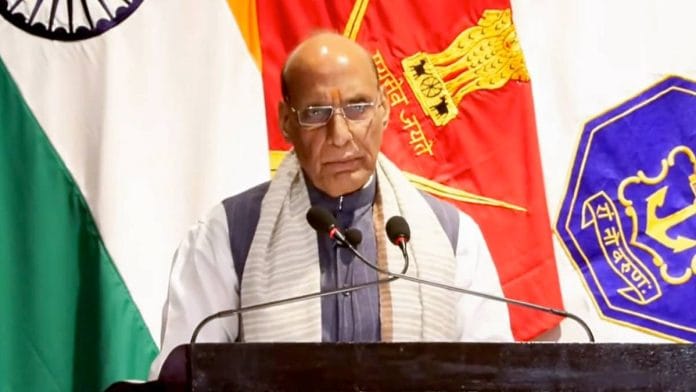Mhow: Citing the Russia-Ukraine war and Operation Sindoor as examples, Union Defence Minister Rajnath Singh Wednesday said warfare is changing fast even during conflict and India will have to prepare for two months to even a five-year war. He also said India will have to imbibe technology at a faster rate.
The defence minister emphasised on having joint fighting capabilities, which he said was one of the key reasons behind the success of Operation Sindoor this May.
He further underlined the importance of dialogue even while a conflict was ongoing.
Singh said that in today’s era, wars have become so sudden and unpredictable that it is very difficult to predict when any war will end and how long it will last.
“So we must be prepared for every situation. We must be prepared for this so that our current capacity is sufficient, that is, if any war is spread from two months, four months, a year, two years, even five years, then we should be fully prepared for it,” he said, speaking on the concluding day of Ran Samvad, a tri-service seminar being held in Mhow, Madhya Pradesh.
Talking about the tactics, he added: “Sheer numbers of soldiers or the size of weapon stockpiles are no longer enough. Cyber warfare, artificial intelligence, unmanned aerial vehicles and satellite-based surveillance are shaping the wars of the future. Precision-guided weapons, real-time intelligence and data-driven information have now become the cornerstone of success in any conflict.”
On the Russia-Ukraine conflict, he said: “When the conflict started in 2022, it was primarily conventional warfare, including tanks, artillery and rifles. The ground forces were engaged in hand-to-hand combat. But in three years, the nature of this war changed completely. Now we are witnessing that various types of war systems and doctrines are being deployed in this conflict.”
“Now, drones, sensor-based weapons, and precision-guided munitions are playing a decisive role. This change shows how the methodology and tactics of war can change in just a short period of time. It is also clear from this that even in the future, in any conflict, we will not have to rely only on traditional means but will have to keep pace with technological advancements continuously.”
He said the fusion of technology and the element of surprise is making warfare more complex and unpredictable than ever before.
That is why we must not only master existing technologies but also ensure that we are constantly prepared for new innovations and unforeseen challenges, he explained.
“The most striking feature of this element of surprise is that it no longer has a permanent form. It keeps changing, always carrying uncertainty with it. And it is precisely this uncertainty that confounds adversaries, often becoming the decisive factor in the outcome of war,” he added.
Talking about Operation Sindoor, he said a crucial lesson—the importance of information and cyber warfare in today’s age—has been understood.
“While enhancing our defence capabilities, it is equally vital to ensure that our information and cyber infrastructure is made even more robust. I believe we must give this matter deep thought and careful consideration,” he asserted.
According to the minister, Operation Sindoor has emerged as a great example demonstrating the success of indigenous platforms, equipment, and weapon systems.
“Its achievements have once again underlined that in the time to come, self-reliance is an absolute necessity. We have indeed made significant progress on the path of self-reliance but there is still a long way ahead,” he said.
Describing Operation Sindoor as technology-driven, Singh said be it offensive or defensive techniques, operational practice, quick and efficient war logistics, seamless integration of forces or matters of intelligence and surveillance, the operation gave a wealth of lessons.
“It provided us with a glimpse of the kind of challenges and responses that can serve as valuable guidance in any future conflict,” he said.
(Edited by Nida Fatima Siddiqui)
Also Read: First-of-its kind tri-services conference Ran Samvad to take place in Army War College next week







Could barely afford a four-day war against Pakistan, how will you afford a long war, Mr Singh? Stick to freebies, subsidies, reservations, and loan waivers; chanting long live socialism.